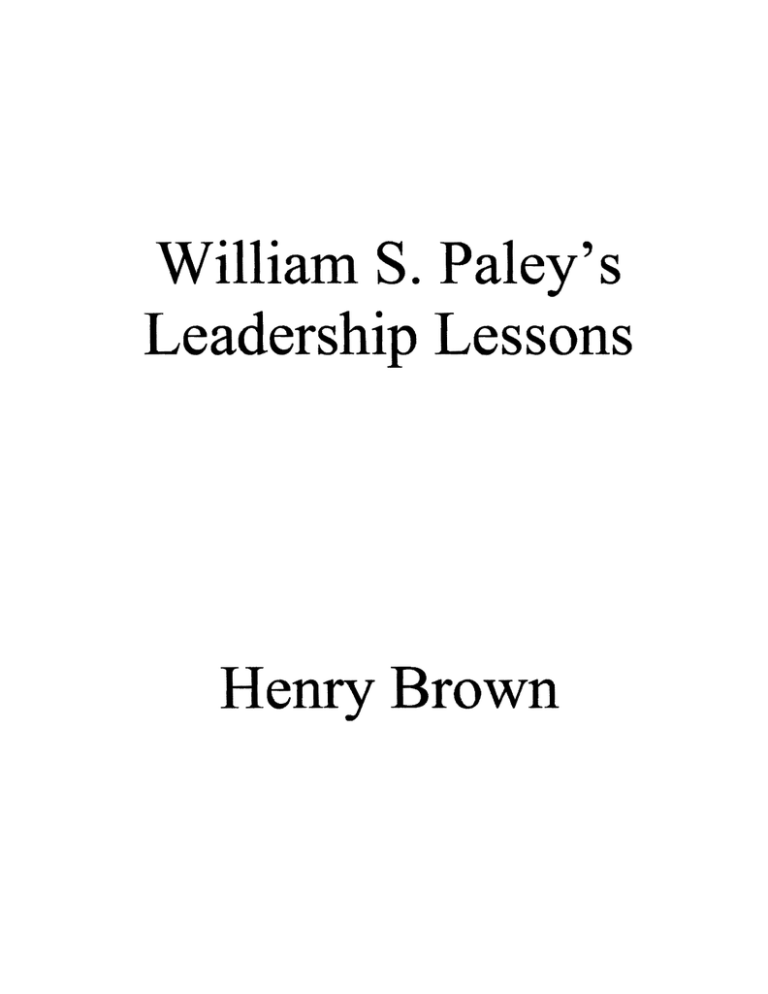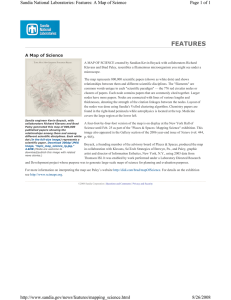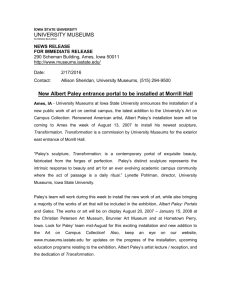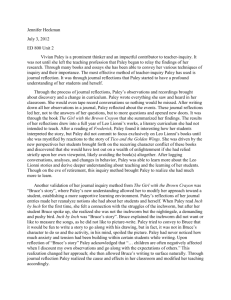William S. Paley's Leadership Lessons Henry Brown
advertisement

William S. Paley's Leadership Lessons Henry Brown William S. Paley's Leadership Lessons An Honors Thesis (HONRS 499) By Henry Brown Thesis Advisor Bruce Geelhoed Ball State University Muncie, Indiana December 14, 2007 May 2008 • I . ~ I' .~.} I i / . ' Abstract William S. Paley was a great innovator of radio and television as we know them today. He was a very successful man from whom a lot can be learned. His career at the Columbia Broadcasting System (CBS) can be divided into five major decisions that he made that had a great effect upon the outcome of the company. These decisions I have collectively summarized as William S. Paley's Leadership Lessons. Included in this thesis are the five decisions: starting CBS, structuring CBS, capitalizing on World War II (WWII), transitioning into television broadcasting. and finally choosing a successor. I also expanded upon these decisions and explained why each decision was important. Paley was a determined, goal-oriented, competitive, and successful man who changed broadcasting tremendously. I tried to capture all of these attributes in this paper. Acknowledgements -I would like to thank Dr. Bruce Geelhoed for advising me throughout this project. He was helpful in not only deciding upon a topic, but also in helping me come up with the main ideas for the paper. He also proofread and made suggestions for my final draft of the paper. William S. Paley's Leadership Lessons Introduction: Creative, business-oriented, competitive, and successful--these four adjectives help to depict the late William S. Paley. William (Bill) Paley is often considered the father of the Columbia Broadcasting System (CBS). His life was much more than that, however. From 1929 when he first purchased CBS until 1990 when he died of a heart attack, Paley was deeply committed to excellence. Paley led a very interesting life and proved that true success in business does not rely solely on education or family succession. Although for Paley, if it had not been for the wealth of his grandfather Isaac Paley in Russia, his family would never have made it to the United States in the first place.! Bill Paley was the son of Jewish immigrants, the oldest child of Samuel and Goldie Paley. The family traveled around the United States before finally settling in Chicago, Illinois. His father, Samuel, started a cigar business once he arrived in the United States, and became quite successful. At this point in time, it was customary in the Paley family for the males, not females, to be in control of the family. It was no surprise then that Bill, not his sister Blanche, was guaranteed a good job in the family business, the Congress Cigar Company, and therefore slacked off a little in schooF However, Bill Paley did everything but slack off when it came to cigars. He was quick to learn the business and soon knew almost everything there was to know about cigars, as did his father. Moreover, his father also knew that he wanted his cigar business to be free of union involvement. This posed quite a problem because the cigar industry in Chicago was rapidly unionizing. Therefore, Samuel Paley decided to move his family to Philadelphia, Pennsylvania where the cigar makers were rapidly avoiding unionization. 3 After the family moved to Philadelphia, Bill began to get involved with the cigar company. He graduated from the Wharton School at the University of Pennsylvania and began working full time with his father at the Congress Cigar Company. At this point in time, both Bill and his father were satisfied with him working there, and it appeared that Bill would carry on the leadership of the family company. However, Bill was later drawn away from the cigar industry and towards broadcasting. Bill took some of the money that he earned in his father's cigar business and invested it in the radio broadcasting business. Paley's life in broadcasting can be divided into five major decisions that he made during his lifetime. These five decisions can collectively be summarized as William S. Paley's Leadership Lessons. The first major decision that he made was starting CBS. He was responsible for taking a small network that was hardly recognized and creating the giant empire that became CBS. Throughout this entire process, Paley was also competing with the Radio Corporation of America (RCA) and the National Broadcasting Company (NBC), which at the time were part of the same entity. The next decision he had to make was how to structure CBS. He had to hire the right people, put them in the right positions, and at the right time. The third major decision he made was to use the CBS radio network as a device to capitalize on the major events of World War II by reporting this information to the people back home in the United States in the form of news. This was no easy task, because prior to this point, radio was simply a means of entertainment. Therefore, he could not have done this alone, but rather had the help of Edward R. Murrow, General Dwight D. Eisenhower, and many others. His fourth major 2 decision was taking CBS from simply a radio network to a combined radio and television network, focusing mainly on the advent of color television. Finally, his fifth and final major decision was choosing a successor. This posed quite a problem for him and it was difficult for him to find someone to take over CBS after he had retired. Long before this retirement, however, Paley had a dream for CBS. Starting CBS: The 1920s Paley's first encounter with radio advertising occurred even before CBS was even a thought on his mind. He was a young man at the time and worked for his father in the cigar industry. One week in particular, his father and uncle went on a business trip to Europe. While they were gone, Bill was left in charge of the company. As a result, he decided to make one large executive decision while he had the chance. He decided to purchase some advertising space for his father's cigars on a local radio station. He spent $50 per broadcast and no one was the wiser, until his father and uncle returned home. As they were going over the books, Bill's uncle noticed a change in advertising expenses. His uncle was outraged and demanded that the radio advertising be cancelled immediately. Shortly thereafter, Bill talked it over with his father and a half-hour radio show called The La Palina Smoker was created.4 This new program forced Bill Paley to become well acquainted with a company known as the United Independent Broadcasters (UIB). The UIB was created by Arthur Judson. It was just a small network until it was incorporated on January 27, 1927. At this point, the Columbia Phonograph Company entered the picture. Arrangements were later made and it was determined that the new 3 name of VIB would be the Columbia Phonograph Broadcasting System in return for Columbia's financial backing. Not long after this incident, the company dropped "Phonograph" and became simply the Columbia Broadcasting System (CBS). When this happened, the company was owned by Jerome Louchheim, a wealthy man that just happened to be a close friend of Samuel Paley. 5 However, Louchheim was having difficulties in producing a financially sound company. So Louchheim then approached Bill's father, Samuel, with a business proposition. He was offering to sell the business. Louchheim thought it would be a great investment for Samuel and would help expand his cigar business. Samuel disagreed and declined the offer to buy the company. Bill Paley was not so sure that buying the company was such a bad idea, however. In fact, he jumped at the opportunity with his own million dollars in hand (he only ended up paying $400,000 of his own money along with $100,000 of his family'S money for a total of $500,000). Bill moved to New York to assume full responsibility of the company. Even though he was doing great in his father's business, "He did not like the cigar business and yearned for a job with more excitement:.6 Excitement he got, along with a lot more. A great deal of this new excitement came from Paley single-handedly trying to compete with the largest broadcasting network in the entire world at the time, the National Broadcasting Company (NBC). In fact, when Paley first took over CBS, it was so small that it was not even recognized as a real network by NBC. In addition, very few people ' thought that Paley could take the little company of VIB and make it a competitor in the broadcasting business. Paley did not let this hinder him, however, and he earned a profit in 1934 of $2.27 million. This was a substantial improvement from the net loss of 4 $179,000 in 1928.8 At this point, Paley was feeling very confident both in himself as well as the company. This very same confidence was shaken a little when William Fox, an executive in the movie industry, entered the picture. Fox offered to buy Paley's share of CBS in 1929 for the same price that Paley had paid a year earlier. Paley was deeply insulted and simply walked out of the room. Paley knew that the company that he poured his life into was worth much more than that. In fact, he later told Adolph Zukor, owner of Paramount Pictures, that in order to own half of CBS; it would come at a price of $5 million. Paley was so confident in his company that he wanted ten times the amount he paid for the company. Zukor was reluctant at first, offering him no more than $4.5 million, but eventually gave in and paid Bill the full $5 million. He only agreed after Paley made the argument that "I'm selling the future of CBS, not the present..,9 After some negotiation, this transaction was made, but not in cash, in stock. Even though Paley was not receiving this money in cash, he was not going to be bullied around. He made his terms very clear from the beginning. Paley sold half of CBS to Zukor in return for 58,823 shares of Paramount stock ($3.8 million). Additional terms to this agreement were as follows: CBS had to earn a profit of $2 million dollars in the following two years (by 1931), after those two years Paramount was to repurchase the same stock for $5 million, and to top off the deal, Paley would still have complete managerial control over the company. to Paley had successfully found someone to bear some of the costs of CBS, but the company was still nothing without programs that were pleasing to the audience. 5 Paley wasted no time finding talent for his programs. In fact, while he was trying to rescue CBS, he also helped people such as Bing Crosby, Kate Smith, and Frank: Sinatra launch their careers. Despite Paley's charm and perseverance, this was still no easy task. Paley had a large load on his shoulders and had to create a company that could withstand the test of time. Therefore, the first order of business for Paley was to change the contract between the CBS network and its affiliates. In order to do this, he had to fmd a supporting staff that provided both what the audience wanted, and what Paley needed in a radio network. The Structure of CBS: The 19308 Bill Paley stated in his autobiography As it Happened, that, "During those early days at CBS, I wore many hats. I was the chief executive officer of the company. Also, the chief accountant, the program director and the talent scout."Il This way of operating the business was acceptable for a while, but eventually Paley sensed the need for a change. In 1930, Paley initiated this change by hiring two people that would be very instrumental to CBS for many years to come. These men were Edward Klauber and Paul Kesten. Paley hired Edward Klauber to help alleviate some of the paperwork and the petty details of the administration. Klauber was not his first choice, however. In fact, when Paley first met Klauber it was with thorough dislike. Klauber had a background in journalism and public relations. He had dropped out of college twice, and relied heavily upon the influence of his uncle Adolph. Before coming to CBS, Klauber was an editor for the New York Times. He was known in that company for his lack of compassion. He 6 would force other people to work holidays when they wanted to be home with their families. Despite all of this, Klauber was hired at CBS and immediately began making changes. After he had a door installed connecting his office with Paley's, he instituted a rule concerning how to address Paley. Even though most people in the company called Paley "Bill" to his face, Klauber insisted that he be referred to as "Mr. Paley" except in a personal conversation. This gave Klauber an aura of respect that set him apart from the crowd. In fact, it has even been said by some that Klauber acted as a father figure to the much older Paley.12 Paul Kesten was hired to help promote the network. Keston was described as a good dresser, dynamic speaker, and convincing salesman. However, he did have one major weakness. He suffered from extreme arthritis that prohibited many everyday functions. Kesten was also a person of many peculiar behaviors. He was known for collecting gadgets like watches or cigarette lighters; he owned many souped-up cars and often drove them down Jones Beach at over 100 mph; and often was engaged in 'scintillating conversation' about nothing at alL 13 He was also well versed in many areas, mainly advertising. Paley saw him as an extraverted person bubbling over with ideas. Kesten also had a very interesting way of referring to CBS. Since CBS was so small at the time and NBC was so large, he used a method of talking about radio as a medium for advertising without ever mentioning CBS individually. By doing this, he made CBS seem bigger than it actually was. Therefore, NBC did not seem like such a giant competitor, but rather just another part of radio. However, it did seem that NBC was always one step ahead of CBS when it came to technology. 7 Paley recognized this early on and decided to concentrate on the entertainment factor, not technology. His philosophy was that the radio station could only be as popular as the programs that were aired on it. This posed a problem, however, because popular programs required big-name personalities, who expected big-time compensation. How was a small company like CBS going to afford these types of personalities? Paley came up with just the solution. He would approach an advertiser and ask if they would like to promote a program featuring so-and-so. If the advertiser said yes, Paley would then approach the entertainer (so-and-so) and ask ifhe/she would like to perform for the sum that was agreed upon between Paley and the advertiser, without letting the entertainer know about the existing agreement. 14 Granted there was a lot of running back and forth, but it seemed to be working pretty well for Paley and CBS. This approach did have some potential drawbacks, however. Often Paley would do all of the work involved in bringing the advertiser and entertainer together. Or maybe, he would come up with an idea for a new show only to be told that the advertiser would rather do business with NBC. This frustrated Paley, and even forced him to sometimes question why he even tried. Paley was frustrated being the perpetual underdog. This very same attitude was changed one day as he was walking down Broadway. He passed by two movie theatres as he was walking. The first was a real fine theatre, but was showing a rather mediocre movie. The second was an older theatre without all of the modem updates that was showing a good movie. Paley noticed, however, that there were far more people waiting to get in the second theatre to watch the good movie as opposed to the first theatre showing the average movie. IS It was then that Paley realized what he needed to do. 8 Paley set out in search of talent to bring to CBS in order to attract more listeners than his competitors. He did this by recruiting big names like Bing Crosby. Paley decided to get Crosby despite the rumors that he was unreliable and had failed to show up at many of his own performances. Paley used him along with Morton Downey, Kate Smith, and the Mills Brothers to play opposite Amos 'n' Andy, NBC's most popular show at the time. Later, CBS signed the ever famous Frank Sinatra who had a voice envied by many. Amazingly, Paley managed to juggle all of this while still maintaining his social life. Paley's social life never suffered from running the business! Paley had no trouble keeping his business life separate from his social life. His main reason for separating his business from pleasure was so that he could maintain professional relationships with his business associates. Nevertheless, Paley was somewhat of a 'party animal' outside of the office. He would spend most of his evenings at the theatre or at nightclubs. He also hosted many parties at his three floor apartment. F or this reason, Paley hired a man whose sole purpose was to wake him up in the morning. This man was given specific instructions to drag Paley out ofbed no matter what Paley said or did. Paley would get so frustrated every morning that he would fire this man and tell him to leave immediately and never to return again. Paley would then shower and prepare for business as usual. After his shower, the man whom he just fired would give him a quick massage and ask ifhe was really fired. Every morning Paley would laugh and say no, come on back tomorrow. 16 His night life went on like this until the onset of WWll, then it was time to get down to business. 9 World War II News: The 19405 At the onset of the war, CBS had two main people stationed overseas, Edward R. Murrow and William Shirer. Paley deeply admired Murrow. Perhaps the primary reason for this admiration was due to the ability of Murrow to take the war that was occurring halfway around the world and bring it into the living room of the average American using radio waves. Murrow allowed his listeners to feel as if they were actually participating in the war effort. It has been said that "even when Ed was simply telling a story, it was a performance."l7 Murrow was hired by CBS in 1935. Two years later, CBS thought Murrow would be more beneficial ifhe were stationed in Europe. So in May of 1937, Murrow was on his way to London. After Murrow was in place, he hired William Shirer, and they began to use CBS radio for news, not simply entertainment. This aspect of radio known as news began to stick, and by now it was past the point of no return for CBS. Americans wanted news. They no longer wanted to feel as if they knew little or nothing about the rest of the world. Paley recognized this need and established a staff that was capable of effectively reporting the war. CBS acquired Eric Sevareid, editor, Elmer Davis, freelance writer, and Charles Collingwood and Howard Smith of United Press. This group of men was collectively referred to as "Murrow's Boys."l8 This group was responsible for keeping America informed on the events happening in the war, and as the name applies, they were led by Edward Murrow. Murrow was a Washington State College graduate who headed the European Bureau ofCBS. l9 He to this position seriously and worked long, hard hours. Most 10 people would claim that this hard work paid off for him and he became quite possibly "the best-known and most respected broadcast voice of the war.,,20 Paley once said that "Murrow created indelible portraits of war for his listeners. He was a natural.,,21 He may not have been quite as memorable if it had not been for his signature close, however. Before each broadcast, he would say "This .. .is London" with a great emphasis on the pause. No matter how good Murrow was at reporting this war, nothing was enough to keep Bill Paley away from the action for too long. When the fighting first began overseas, Paley couldn't wait to get involved. He wanted to contribute whatever he could to the American war effort against the Nazis. Even though Paley was constantly working around the clock in the United States and even established several CBS stations in Central America that were later used by the U.S. government as part of the war effort, it was still not enough. So needless to say, Paley was no less than thrilled then when his services were finally requested. The request came from the Office of War Information, and Paley wasted no time. He packed up his belongings and headed for Europe. He decided to leave Paul Kesten in charge of the company in America while he was gone. He finally arrived in London in 1944 where he became "Chief of Radio Broadcasting within the Psychological Warfare Division of SHAEF-Supreme Headquarters, Allied Expeditionary Forces" under General Eisenhower. 22 Along with this assignment came two major responsibilities. First, he was in charge of managing and supervising broadcasts containing propaganda to Germany and all other occupied countries. Second, he was preparing the stations for the worldwide announcement of Dday. 11 Paley was very adamant about promoting the importance of radio broadcasting of the war. He was quoted saying "radio broadcasting is an arm of warfare just as are guns and bullets.,,23 He used this philosophy as he broadcast propaganda during the war. Part of this propaganda was known as "black" propaganda. "Black" propaganda was basically false information sent to the German troops using phony radio stations. Paley was in charge of managing this process, making sure that before "black" propaganda was used, they had to fIrst give accurate information to gain the trust of the Germans. Another type of propaganda used by Paley and his associates was "white" propaganda. White propaganda is the opposite of black propaganda and generally comes from an openly identifIed source and is not intentionally deceptive. Before WWII, CBS established a goal of setting up in all major cities in Europe. The announcement of D-day was a very important event for not only CBS, but also for the rest of the world. Therefore, CBS needed all the help it could get, and General Eisenhower wanted David Sarnoff, the chairman of Radio Corporation of America (RCA). At the time, Sarnoff was considered one of the best communications experts in America. Therefore, Sarnoff was given great responsibilities when it came to war-time broadcasting. His main responsibility was to oversee all radio communication between SHAEF headquarters and the invading armies. 24 In fact, Sarnoff was so highly regarded that he rose to the rank of brigadier general~ and was thereafter referred to as General Sarnoff. Bill Paley, on the other hand, never rose past the rank of coloneL 2S Although he never came out and said it, Paley was somewhat bothered by this difference in rank and it added even more fuel to the fIerce competitiveness between the two 12 companies, and the two men. However, in retrospect, Paley was probably grateful that he went against his gut and decided to accept the position of colonel. General Robert A. McClure approached Paley and asked him to become a military officer. Paley pondered this for a while and decided to decline stating that he wanted to simply remain a civilian. He was later discussing this with one of his old friends and was told "you're a damn fool. Don't give up the chance to have full authority over the military members of your organization. This will become more and more important to you as you go into Germany.,,26 Paley took this into consideration and accepted the position as a colonel in the United States Army. However, even becoming a colonel in the U.S. Army was not enough to prepare him for what lay ahead for CBS. Television: The 19405 and 1950s When Paley returned to the United States after the war, the idea of television was there waiting for him. Perhaps even more exciting was the advent of color television. Color television on the small screen prompted perhaps the fiercest competition between NBC and CBS. However, for once it seemed that CBS was actually ahead of NBC in technology. This was not attributed to Paley because "Paley himself had no feel for the technology. Technology, in fact, intimidated him.'.27 This could be attributed to Dr. Peter Goldmark and Paul Kesten. In fact, color television at the time was referred to as "Kesten's baby.,,28 This may have been true, but without the brilliant mind of the inventor Peter Goldmark, CBS would have again been behind the competition. Goldmark had the technology necessary for creating color television in 1940. This is an amazing feat due to the fact that color television was not in main stream 13 popular culture until after 1965. Granted, a large chunk of this time was devoted to World War II. In fact, six months after Goldmark's ftrst color television experiments, his whole assignment was put on hold because of the invasion of Pearl Harbor. Nevertheless, Goldmark was a master of technology and was a true pioneer of color television. He was especially passionate as well. This passion stemmed from his viewing of Gone With the Wind in color. He said that "something just clicked.,,29 However, it was not an easy road for Goldmark, or CBS and they were faced by many challenges. The ftrst potential problem faced by CBS was the incompatibility of the existing television sets and CBS color. However, CBS was able to overcome this obstacle by creating new televisions that were compatible and marketing them as a new and exciting technology. It should be stated that CBS was able to overcome this obstacle, not Paley. Paley was somewhat reluctant with the whole concept of television. He was never enthused about technology or trying new things. Television, for instance, was never his top priority. In fact, he once had some CBS calling cards created with "CBS Radio" engraved at the top and "Television" typed at the bottom of the card, almost as an afterthought. Therefore, Paley decided to use Frank Stanton as the one to oversee television, while he pretty much stuck with radio. Stanton was ready to get started with television and decided that CBS should build new television stations in Los Angeles, Chicago, San Francisco, and Boston. This required a lot of effort from Stanton, including acquiring licensing from the Federal Communications Commission (FCC). At the same time, Stanton was also asking the FCC to approve the new CBS color system. This seemed like a good idea at the time 14 because it was opening up many doors for CBS. However, all Stanton really did here was shoot himself in the foot. A member of the FCC by the name of Rosell Hyde approached Stanton and asked him why CBS was sending mixed messages. Hyde told Stanton that it was not wise to apply for black and white television station licenses while at the same time promoting a brand new color system. Stanton decided to take his advice and decided to put all of his eggs into one basket. Stanton withdrew his applications for the black and white licenses in the major cities and decided to focus solely on the advent of color television. Stanton was feeling confident in this decision as he had a lot of confidence in the new system, as did many employees of CBS. However, CBS was dealt another crushing blow in March 1947. The FCC denied their request and did not approve of the new color system. The reasoning given for this denial was that no color system was ready for approval at that time. The real reasoning behind this was linked to Paley's nemesis, David Sarnoff of NBC. Sarnoff was doing everything he could to block any new technology that would inhibit his own black and white television. Sarnoff had focused almost exclusively on black and white television. His goal was to get these televisions into as many American homes as possible. After the wartime ban on all televisions, he was able to accomplish just that. America was in a time of peace following many months of fighting. The economy was looking up and Americas wanted more leisure time. Once again, NBC had the advantage and CBS was stuck in the shadows. As if that wasn't enough, Sarnoff decided to establish an NBC television network by putting stations in some of the large cities across the United States.31 CBS 15 was caught off guard and could only hope that their new color system succeeded in an unprecedented manner. Sarnoff seemed to have the answer for this as well. He decided to launch a campaign geared towards criticizing CBS color television. Some of his main arguments were the fact that despite the new technology, color television could only be watched on screens that were much smaller than the average black and white set. He also emphasized the fact that in order to watch these programs, consumers had to purchase a new television, because their existing televisions would not be compatible. Unfortunately for CBS, NBC also had the backing of several producers of black and white sets, because new color televisions would limit their existing sales. It wasn't until 1950 that CBS finally caught a break. Peter Goldmark had developed an instrument that allowed black and white television sets the capability of broadcasting CBS color. One year before (1949) this converter was considered very awkward and inefficient. Now it was official, with the assistance of the converter, CBS was way ahead of NBC in terms of color television. In fact, Sarnoff himself admitted that the NBC system made "the monkeys look green, the bananas blue, and everyone had a good laugh. ,,32 Paley finally achieved what many thought was impossible. He had established a company that was on the same level as NBC. Now it was up to him to find someone to follow in his footsteps and continue what he had started. 16 Choosing a successor: The 1970s and 19805 One of Paley's goals early on in his career was to retire at the age of thirty-five. However, after he turned thirty-five, he realized that there was still much work to be done and decided to keep working. In fact, he did not announce his retirement until 1983 at the age of eighty-one. At this point, the company would be handed over to Thomas Wyman. Before this, Wyman was CBS director, replacing John Backe only a few years earlier. Backe had replaced Charles Ireland who died less than spending one year on the job, and he replaced Arthur Taylor who only lasted four years. 33 This created two questions for Paley at the time he hired Thomas Wyman. First, why is no one staying in this position? The second question was will Thomas Wyman be capable of handling a position of this magnitude? Thomas Wyman was educated at Andover and Amherst, and had an impressive background, but not in broadcasting. Wyman actually came from Pillsbury. Paley found favor with him and decided to make him president of CBS, replacing John Backe. Backe did not go easily, however. In fact, before Paley could even approach him with the news, he had already exploded and was running around in a rage. Eventually Backe left and Wyman took over. Wyman was given a $1 million signing bonus and a yearly salary of $800,000.34 Things were great for a while and a close-knit relationship formed between Paley and Wyman. In addition, Wyman kept a low profile for the entire first year as president. It wasn't until late 1981 that all of this began to change. Wyman was in an interview with the New York Times when he said "I don't think there's any question in anyone's mind that I'm running the company." He went on to say that Paley had been "helpful," but did not expand on that any further. 35 Paley was not 17 surprisingly bothered by this comment and it became the first thorn in his side after hiring Wyman. For the next couple of years, the tension seemed to be getting worse, although it was simply swept under the rug. When Paley announced his retirement in 1983, he told everyone that his successor was in place and that Wyman had his permission to run the company as he saw fit. After Paley had stepped down, Wyman made it clear that he was the undisputed boss. Wyman even went as far as to tell his employees to acknowledge him as the sole president and not to allow Paley to be a "jack-in-the-box" and pop in whenever he wanted and try to run things. 36 He also began changing company traditions and even went as far as to ban Paley from attending some of the more important meetings. He was forced to watch the meetings through the crack in the door. 37 These types of stabs made at Paley continued for a while and before long, Wyman, it seemed, was more interested in keeping Paley at arm's length away than he was at running the company. By the time the year 1983 rolled around, Laurence Tisch began to become a prominent figure for CBS. He was chairman of Loews Corporation and he was a large investor in CBS stock. In fact, he became the largest shareholder when he purchased 10 percent of the total stock. At the time, Paley only owned about 8 percent. This was only the beginning for Tisch and he continued to acquire more and more stock. In addition, he slowly but surely managed to creep his way deeper and deeper into the company. At the same time, he also maintained a relationship with Bill Paley. The combination of his large amount of stock along with his close relationship with Paley began make Wyman a little nervous. 18 This anxiety and tension was amplified when Tisch began criticizing Wyman openly. This criticizing began after Wyman requested a standstill before Tisch could reach 25 percent of CBS stock. Tisch was quoted saying "Wyman is a nice man, but he is not a good businessman:,38 It seemed that the odds were beginning to stack against Wyman. The two most influential people at CBS, Paley and Tisch, both had their reasons for disliking the current president. The next step for CBS seemed inevitable, another change in management was necessary. Paley knew it and scheduled a meeting and did not invite Wyman or Tisch. In this meeting, discussion was held on why Wyman had to go, and also why Tisch should assume the position. Shortly after this meeting, Paley requested that he himself become chairman and Tisch become the chief executive of CBS. The board agreed, and Wyman was forced to resign. Once again Bill Paley was in charge of CBS, and this did not seem to bother Laurence Tisch at alL Conclusion: Like every great leader, much can be learned from the life of William S. Paley. His leadership lessons can be applied to many aspects of life, not just in the business world. The five major decisions outlined in this paper are far from the only decisions Paley made in regards to making CBS great. However, they do provide a solid framework for determining what made him a great leader. In addition, these decisions were all contingent upon one another. If Paley had chosen another alternative to any of these decisions, it would have had a tremendous impact on the company. 19 Paley saw CBS as more than just a company. In fact he was once quoted saying this about CBS, "I'm like a father with a child, and I want it to succeed when I'm gone.,,39 Paley wanted everyone to know that he poured his life into CBS, and wanted above all else to see it succeed. Paley was a man of great perseverance. His life at CBS was not one of ease. He encountered hardships nearly every step of the way. The important thing is he stuck with it. Paley realized that simply starting a company was not enough. In order for the company to reach true success, CBS needed someone that would make a life out of it, not simply a career. The story of William S. Paley is not exactly a rags-to-riches story with a happy ending, but it is a story from which much can be learned. Paley was so involved with his work at CBS that he abolished the mandatory retirement law so that he could remain president. He eventually did retire, but even then decided that CBS could not survive without him. He returned to work and finished out his life at CBS until his death in 1990 at the age of 89. Paley did much more for CBS than what has been recorded on paper. He established many traditions, developed certain ways of doing things, and had a lasting impact on many people he came in contact with. 20 Bibliography Boyer, Peter. Who Killed CBS? New York, NY: Random House, 1988. Clark, E. CBS Spotlight. TIME, September 20, 1980,6-8. Halberstam, David. The Powers That Be. New York, NY: Alfred Knopf, 1979. Murrow, Edward. In Search ofLight. New York, NY: Alfred Knopf, 1967. Paley, William. As It Happened. Garden City, NY: Doubleday and Company INC, 1979. Paper, Lewis. Empire. New York, NY: St Martins Press, 1987. Murrow, Edward. This is London. New York, NY: Simon and Schuster, 1941. Smith, Sally. In All His Glory. New York, NY: Simon and Schuster, 1990. Sterling, Christopher. Paley, William S. Retrieved September 18,2007 Web site: http://www.museum.tv/archives/etblPlhtmIP/paleywillialpaleywillia.htm 21 Notes and References 1. Paper, Lewis, Empire (New York: St. Martin's Press), 1-2. 2. Ibid., 10-12. 3. Smith, Sally, In All His Glory (New York: Simon and Schuster), 41. 4. Paley, William S,As It Happened (New York: Doubleday & Company, Inc.), 35. 5. Ibid., 36. 6. Paper, Empire, 22. 7. Paley, As It Happened, 44. 8. Paper, Empire, 28. 9. Paley,As It Happened, 59. 10. Paper, Empire, 34. 11. Paley, As It Happened, 64. 12. Smith, In All His Glory, 117-19. 13. Paley, As It Happened, 76-77. 14. Ibid,69. 15. Ibid, 76. 16. Ibid,91. 17. Smith, In All His Glory, 166-67. 18. Ibid, 173-175. 19. Murrow, Edward, This is London (New York: Simon and Schuster), 238. 20. Paley, As It Happened, 147. 21. Smith, In All His Glory, 175. 22. Paley, As It Happened, 166. 23. Smith, In All His Glory, 212. 24. Smith, In All his Glory, 214. 25. Paper, Empire, 122. 26. Paley, As It Happened, 175-176. 27. Halberstam, David, The Powers That Be (New York: Albert Knopf), 127-128. 28. Paley, As It Happened, 186. 29. Paper, Empire, 119. 30. Smith, In All His Glory, 277-81. 31. Ibid,279. 32. Ibid,283. 33. Boyer, Peter, Who Killed CBS? (New York: Random House), 88-89. 34. Smith, In All His Glory, 551. 35. Ibid, 560. 36. Paper, Empire, 351-52. 37. Smith,In All His Glory, 568. 38. Ibid, 582-83. 39. Clark, E. Paley, William S. (Time),6. 22






